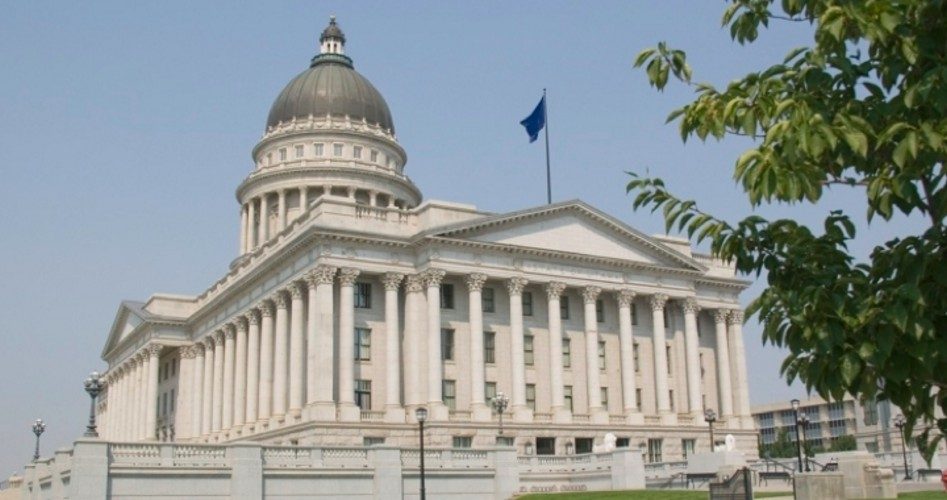
Among the several bills passed by the Utah state legislature as it wrapped up its annual session, one protects citizens of the Beehive State from warrantless drone surveillance.
On March 13, the Utah State House of Representatives joined their colleagues in the other chamber and passed SB 167, the Government Use of Unmanned Aerial Vehicles Act, by a vote of 67-5 (3 members did not vote).
The measure was introduced in January by State Senator Howard Stephenson and includes promising protections of fundamental civil liberties.
For example, the bill explicitly prevents data obtained from an unmanned vehicle from being admissible in court unless the data was obtained pursuant to a warrant or some judicially permitted exception to warrant requirements.
Additionally, any information obtained by a drone may not be used as part of the affidavit required to obtain a warrant.
As an added precaution against the violation of freedom from unwarranted search and seizure, the bill requires that any data incidentally obtained by a drone of a “person, structure, or area” that isn’t a legal target of the surveillance must be destroyed “as soon as is reasonably possible” by the state agency that collected the data. There are a few exceptions to this requirement, notably if the collection of data by drone includes evidence of a crime in progress or an emergency situation.
Another important provision mandates that the state government publish a report disclosing the number of times law enforcement deployed a drone, the number of criminal investigations aided by the use of a drone, a description of how the drone was used in the investigation, and the frequency and type of data gathered by the drone.
The bill also requires the state to report to the public how many times an agency other than law enforcement used a drone.
Law enforcement must submit an additional report revealing how many warrants were issued authorizing the use of a drone and how many requested warrants were denied by the judiciary.
Unfortunately, in the final version of the bill passed by the legislature, several key protections of civil liberties were removed, including one forbidding the use of drones to aid in facial recognition or biometric matching and one outlawing the future weaponization of drones used in the state.
Though diluted, the effort is praiseworthy and the Utah legislature is wise to fire a preemptive legislative strike at the use of drones, particularly in light of Utah’s eager embrace of other agencies of the surveillance state.
Just west of Interstate 15 — the state’s principal north-south corridor — is the National Security Agency’s Utah Data Center.
The $2-billion campus is up and running and is equipped with computers capable of monitoring, recording, and cataloging every electronic communication of every American indefinitely.
How did local media report on this threat to the Fourth Amendment being built in Utah?
“The data center is estimated to be 1 million square feet, sitting on 200-acres, and it couldn’t come at a better time for Utah’s economy,” reported KSL. The report exulted that “even Congressman Jason Chaffetz is excited. From Washington he told KSL News: ‘It’s a benefit to our economy and our national security.’ ”
Curiously, although it lost out in the drone testing lottery, the governor’s website still makes the case that when it comes to unmanned aerial vehicles, there’s no place like Utah. The Office of Economic Development’s website reminds the feds of Utah’s pro-surveillance, pro-military-industrial complex resumé:
If you develop or test unmanned systems you need space, infrastructure, talent and a good supply chain. In other words, you need Utah.
Our unique setting in the high desert of the Intermountain West provides hundreds of square miles and 58,000 feet of elevation [the total elevation of available ranges] for testing. As a specific industry cluster our state government is interested in growing, unmanned systems companies can find the incentives, support, workforce development and business-friendly environment they need to thrive. And an existing community of industry leaders such as L-3 Communications, Northrop Grumman, General Atomics and AeroVironment ensure a robust and fully functioning supply chain.
Not even a hint at the legitimate concerns about these products’ potential violations of the Fourth Amendment’s protection against unwarranted searches and seizures. The Fourth Amendment reads:
The right of the people to be secure in their persons, houses, papers, and effects, against unreasonable searches and seizures, shall not be violated, and no warrants shall issue, but upon probable cause, supported by oath or affirmation, and particularly describing the place to be searched, and the persons or things to be seized.
In Utah, it seems, when it comes to hosting the forces of the surveillance state, even a long shot at more jobs and money trumps the very real threat to liberty and the Constitution posed by these ventures.
It will be worth watching, as well, how the new bill, should it become law, would effect the relationship between the Department of Homeland Security (DHS) and the state’s law enforcement agencies that have been beneficiaries of the federal attempts to control local police, a scheme that includes doling out millions in grant money to help local law enforcement buy sophisticated weaponry and equipment, including drones.
Drone technology developed for the military will soon be deployed in the domestic skies, and citizens will be instantly transformed into suspects. States and cities must now step into the gap and defend citizens from being deprived of their most fundamental rights. The Utah State legislature has now taken a small, but laudable step toward that goal.
Photo: Utah State Capitol Building



